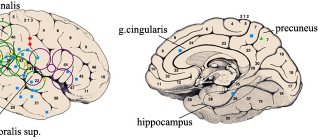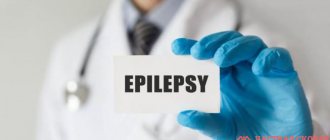Epilepsy is a common complication that leads to chronic alcoholism. Seizures with or without convulsions are a reaction of the nervous system to alcohol poisoning. At first they appear after drinking alcohol, but as the course of the disease becomes chronic, they continue in a sober state. Typically, alcoholic epileptic seizures develop in people 27-45 years old with 7-10 years of alcoholism. However, complications may appear earlier – after two years of active drinking.
What kind of disease is this
Epilepsy is a disease of a psychoneurological type. A common symptom of epilepsy is sudden seizures that occur as a result of stimulation of one or more areas of the brain.
During an epileptic seizure, a person cannot control his thoughts, feelings and movements. The vegetative functions of the body are also disrupted.
The causes of the disease may be:
- heredity;
- a consequence of injury or congenital abnormalities.
Experts also identify a third cause of epilepsy – cryptogenic, that is, it is not possible to detect the true nature of the disease. According to statistics, in 80% of cases it is not possible to determine the real cause of the disease.
After the first signs of the disease are detected, the person is under constant monitoring by a neurologist.
Epilepsy is treated with medications that are aimed at:
- general anesthesia during an attack;
- reduction in seizure duration;
- reducing the number of attacks and increasing the interval between them.
In addition to drug treatment, surgical intervention is possible. The operation is justified if specialists manage to identify the causes of seizures as accurately as possible and find the source of seizure development.
Treatment with medications can be carried out both in a hospital and on an outpatient basis (the method is determined depending on the state of health). Some people have to take medications for the rest of their lives, while others only need one or two courses of treatment.
Relatives and friends should pay special attention to the patient, since during an attack a person cannot always cope with the situation on his own.
Often, due to improper first aid or simple ignorance from others, an epileptic attack ends in death. Quite often, a person’s death occurs if an epileptic attack occurs during sleep.
A patient with epilepsy should not be allowed to perform certain types of work, namely:
- work at height and underground;
- related to electricity;
- work on equipment under pressure;
- employees who are required to carry weapons;
- food industry;
- raising and teaching children;
- medicine;
- sport.
In Russia, persons suffering from epilepsy do not have the right to drive vehicles of any category. However, there are exceptions to all rules.
Diabetes
Diabetes is a disease in which your body cannot properly maintain glucose or blood sugar levels. If not treated correctly, diabetes can cause damage to the nerves in the arms, legs and feet. In severe cases, diabetes leads to blindness, heart disease, and stroke. Other symptoms of diabetes that may put you at risk when driving include:
- Drowsiness or dizziness.
- Blurred vision.
- Loss of consciousness.
If you have diabetes and are experiencing one or more of these symptoms, consult your doctor to begin treatment.
In what cases are people with epilepsy allowed to drive a vehicle?
The medical commission makes decisions on the admission of people to certain jobs, including driving cars and other technical equipment, on the basis of Order No. 302n, adopted by the Ministry of Health on April 12, 2011. This document was last revised in December 2021
Diseases that limit the right to drive are covered in paragraph 27 with subparagraphs related to a specific category of vehicles.
In addition to epilepsy, restrictions for obtaining rights are:
- complete or partial loss of vision and/or hearing;
- other eye diseases;
- lack of full motor ability of the limbs;
- some diseases of the cardiovascular system;
- alcoholism and/or drug addiction;
- certain diseases of the human endocrine system;
- some gynecological diseases.
A complete list of existing restrictions for obtaining a driver’s license can be found by carefully studying the presented document.
All drivers are divided into two large categories:
- persons driving vehicles not intended for transporting people. This includes categories A, B, C and their corresponding subcategories;
- persons involved in the transport of people (category D).
For the first group of drivers, the rules for admission to driving for medical contraindications are less strict than for the second group.
A person will be allowed to drive vehicles belonging to the first group if:
- he periodically undergoes medical examination until more than 5 years have passed since the last attack. A medical certificate for a driver's license must be issued once every 2 years. However, if you have epilepsy, the driver is required to undergo commissions at intervals specified by a specialist doctor;
- during examination by a neurologist, an individual conclusion was given about the driver’s fitness;
- more than 6 months have passed since the last attack, and during this period no symptoms of the disease appeared;
- according to experts, the patient does not have the possibility of an attack while driving, that is, driving a car is not a reason for a relapse of the disease;
- attacks of the disease occur exclusively during sleep;
- During an epileptic attack, a person’s consciousness and motor functions are not impaired;
- relapse of the disease is justified by discontinuation of the drug. The driver is suspended from driving for 3 months, provided that the course of medication is resumed;
- underwent treatment in the form of surgery.
You can drive vehicles of the second group if:
- More than 10 years have passed since the last attack, and during this time the person completely managed without medication;
- exclusively provoked attacks occur, and driving is not one of the irritants;
- There was a single attack that did not recur for 5 years.
Thus, it is possible to obtain the right to drive a vehicle for a patient with epilepsy. The decision is made by the attending physician (in some cases, a council of doctors) individually.
And it can be accepted with some restrictions, which are necessarily prescribed on the driver’s license.
Epilepsy is a contraindication for obtaining a driver's license. However, the decision is made by the medical commission in each individual case individually. The selected category of vehicle also influences the inspection result.
The attitude of the people around the sick person is also important. Indifference can lead to the death of a person.
The punishment for repeated deprivation of a driver's license is discussed in the article:
re-deprivation of driver's license
.
Whether it is possible to change a driver's license before the expiration date is explained on the page.
Find out how to challenge the revocation of a driver's license for drunkenness from the information.
Is it often misdiagnosed?
Elena Morozova : Yesterday I had a vivid example, a 15-year-old patient. Creative family, girl performing. She was diagnosed with epilepsy several years ago, and the doctor told her about it very dramatically. The result was two suicide attempts in 2 years. The girl decided that she had an illness, she couldn’t perform, her creative career was over, and so was her life. The child lives on antidepressants. But as a result of the examination, it turned out that she was diagnosed incorrectly and she did not have epilepsy. And this is very serious, because once a diagnosis is made on the card, which may be erroneous, remains with the patient forever. Healthy young people often come to me and say: “I want to serve in the army, drive a car, but I had one attack, and the diagnosis is not being removed.” But it is very difficult to remove the diagnosis in Russia.
Is it possible to get a license if you have epilepsy?
In the Russian Federation, as in many countries, obtaining a driver’s license takes place in two stages: passing an exam and issuing a medical certificate of suitability to drive a vehicle of a certain category.
It is realistic to undergo a medical examination only in accordance with Order No. 302n. It also spells out all types of diseases for which it is impossible to obtain a driver’s license.
Is epilepsy included in this list of diseases?
In the Russian Federation, people with epilepsy are legally prohibited from driving, regardless of category. But there is always a chance and exceptions to the rules.
Why are people with epilepsy prohibited from driving?
While driving a vehicle, the driver must:
- Be able to immediately perform the required maneuver;
- Fully control your body.
To reduce accidents, these health restrictions were invented.
What happens to a person during an attack:
- The normal functioning of the brain is disrupted. For some, the attack is associated with fainting;
- The physical condition of a person is disrupted, and he is unable to control his arms, legs and his body as a whole;
- Mental disorders;
- Dizziness, hallucinations;
- The function of the auditory and visual organs is impaired.
An epileptic attack can lead to an emergency on the road and lead to the death of innocent people and road users. Therefore, citizens with this disease cannot be allowed to drive a car.
Drivers are divided into two categories: those who drive passenger vehicles and those who transport people in large vehicles. The demand from drivers of the second category is stricter due to medical contraindications.
Conditions for admission to driving of the first category of persons:
- Obtaining a medical certificate every 1-2 years;
- There is a certificate from a neurologist about permission to drive;
- Six months have passed since the last relapse;
- Seizures that occur during sleep;
- Seizures without impaired motor function and without loss of consciousness;
- If the drug is discontinued, the driver does not have the right to drive for 3 months. You can renew your rights if you complete a course of medication;
- Treatment with surgery.
Conditions for admission to driving of the second category of persons:
- The last attack of epilepsy was more than 10 years ago and during this period of time he did not require drug treatment;
- Epilepsy seizures occur only in provoked situations and driving a car does not cause a negative impact on the person’s condition;
- A case of one attack that occurred more than 5 years ago.
As a result, it is possible to obtain a driver's license with epilepsy. The decision is made by the neurologist with whom you are registered. In severe cases, a council of doctors gathers to consider this issue.
A positive decision is made subject to certain conditions and restrictions, which are indicated in the driving document.
Important! In order to obtain a permit to drive a vehicle, you need a medical certificate of health that is current at the moment.
Epilepsy is a strict contraindication to obtaining a driver's license.
And each case is considered individually by a medical commission, where the selected type of transport management categories plays an important role in decision-making.
To obtain a license to drive a passenger car (work as a driver is excluded), the conditions are softer than for permission to drive other types of categories of vehicles.
Epilepsy needs to be treated, and others need to be more attentive to the category of people with this disease, because heartlessness can lead to the death of a person.
Laws restricting the receipt of a driver's license for people with epilepsy are different in each country. Currently, the risk of road accidents for people with epilepsy is much higher than for other citizens. In this regard, driving in Russia is officially prohibited for people with epilepsy.
Below is an extract from the international law on diseases limiting driving.
12. Epileptic seizures or other conditions manifested by a sudden loss of consciousness pose a serious danger, significantly increasing the risk of road accidents when they occur among motor vehicle drivers.
Epilepsy is defined as two or more epileptic seizures occurring less than 5 years ago (if less than 5 years have passed since the last seizure). A provoked epileptic seizure is a seizure caused by a known precipitating factor that can be avoided. (EN 26.8.2009 Official Journal of the European Union L 223/33.)
If the first or isolated (one-time) epileptic seizure or episode of loss of consciousness occurs, it is recommended to stop driving. It is necessary to draw up a specialist report indicating the period of restriction of rights to drive vehicles and recommendations for further observation.
In all cases, it is fundamentally important to establish the specific epileptic syndrome and the type of seizures, which allows for an adequate assessment of the safety associated with driving (including the risk of further seizures) and the prescription of adequate therapy. These measures should be carried out by a neurologist.
Epilepsy - group 1
12.1. Drivers with epilepsy driving vehicles classified as group 1 must be monitored and undergo periodic medical examinations until the duration of remission (episode-free period) reaches 5 years.
The diagnosis of epilepsy is an indication for restricting the right to drive a vehicle and requires sending a notice to the authorities responsible for issuing driver’s licenses.
12.2.
Provoked Seizures: In cases of provoked seizures associated with known precipitating factors that are not likely to occur while driving, driver license applicants may be found fit to drive on an individual basis, depending on the opinion of a neurologist (assessment should be based on other important sections of Annex III (for example, in cases of alcoholism and other related diseases).
12.3. First or single unprovoked epileptic seizure: if the first unprovoked seizure occurs, permission to drive a vehicle is given to the applicant for a driver’s license after 6 months.
attack-free period, subject to a detailed medical examination.
Legislative bodies of specific countries may allow drivers with additional factors indicating a favorable prognosis to begin driving sooner.
12.4. Episodes of loss of consciousness of other etiologies: Episodes of loss of consciousness should be assessed depending on the existence of a risk of recurrence while driving.
12.5. Epilepsy: Drivers or driver's license applicants may be considered fit to drive after a seizure-free period of 1 year.
12.6.
Epileptic seizures occurring exclusively during sleep: Drivers or driver's license applicants who have never had an epileptic seizure other than an epileptic seizure occurring exclusively during sleep may be considered fit to drive if the seizure pattern persists for a period of time not less than the duration of the seizure-free period required to obtain a driving license for patients with epilepsy. If an epileptic seizure occurs while you are awake, the seizure-free period required to obtain a driver’s license is 1 year (see section “Epilepsy”).
12.7.
Epileptic seizures that do not affect consciousness and motor activity: applicants for a driver's license or drivers who have never had an epileptic seizure, other than seizures that do not lead to impairment of consciousness and do not cause functional impairment, may be considered fit to drive a car if the seizure the pattern persists for a period of time no less than the duration of the seizure-free period required to obtain a driving license for patients with epilepsy. If an epileptic seizure of any other type occurs, the duration of the seizure-free period required to obtain a driver's license is 1 year (see section “Epilepsy”).
12.8. Epileptic seizures that occurred against the background of changes in therapy and provoked by a decrease in doses of antiepileptic drugs: the patient is recommended to stop driving for the period of discontinuation of antiepileptic therapy and for 6 months.
after stopping treatment. Epileptic seizures that occur due to a change or discontinuation of antiepileptic therapy prescribed by a doctor require abstinence from driving for 3 months. subject to resumption of previous, previously effective therapy.
12.9. After surgical treatment of epilepsy: see section “Epilepsy”.
Epilepsy - group 2
12.10. The driver's license applicant must be in remission for the required duration without taking antiepileptic drugs. Regular medical examination and monitoring is necessary.
Required criteria identified by neurological examination: absence of serious brain damage and absence of epileptiform activity on the electroencephalogram (EEG). After the occurrence of an acute episode, an EEG and a detailed neurological examination are necessary.
(EN L 223/34 Official Journal of the European Union 26.8.2009)
12.11.
Provoked Seizures: In the event of provoked seizures associated with known precipitating factors that are not likely to occur while driving, driver license applicants may be found fit to drive on an individual basis, based on the opinion of a neurologist. After the occurrence of an acute episode, an EEG and a detailed neurological examination are necessary.
If a structural brain disorder associated with an increased risk of epileptic seizures is detected, drivers are not permitted to drive vehicles classified as Category 2 until the risk of epilepsy is reduced to ≤ 2% per year. The assessment should be carried out taking into account other relevant sections of Annex III I (eg in cases of alcohol consumption).
12.12.
First or single unprovoked epileptic seizure: upon the occurrence of the first unprovoked seizure, permission to drive vehicles is given after 5 years of an attack-free period without antiepileptic therapy, subject to a detailed neurological examination. Legislators in specific countries may allow drivers with factors that indicate a favorable prognosis to begin driving sooner.
12.13. Episodes of loss of consciousness of other etiologies: Episodes of loss of consciousness should be assessed depending on the existence of a risk of recurrence while driving. The risk of relapse should be ≤ 2% per year.
12.14. Epilepsy: remission lasting 10 years without taking antiepileptic drugs is required. Legislators in specific countries may allow drivers with factors that indicate a favorable prognosis to begin driving sooner. The latter also applies to cases of “juvenile epilepsy”.
Source: https://jepilepsija.ru/epilepsiya/44-epilepsiya-i-avtomobil-mozhno-li-poluchit-prava-pri-epilepsii
Treatment
The first attack is a reason to make an appointment with a neurologist and epileptologist. Alcohol-induced epilepsy is not considered a fatal diagnosis. If you take the problem seriously, the disease can be treated well.
A prerequisite for recovery is abstinence from alcohol. It will help eliminate future attacks and increase the chances of recovery.
If you ignore treatment for alcoholic epilepsy or continue to drink in parallel with treatment, seizures will become more frequent. The complication will enter a chronic phase, after which irreversible changes will occur in the brain. At this stage, even giving up alcohol will not help get rid of seizures. Therefore, treatment must be started in a timely manner.
Alcohol cessation is supported by drug therapy. The patient, according to a doctor's prescription, begins to take drugs against seizures: phenobarbital, hexamidine, clonazepam, benzobamil, etc.
After completing the treatment course, the patient is obliged to give up alcohol forever, regularly visit a doctor and be examined.
The appearance of alcoholic epilepsy indicates that brain damage has already occurred and there is some degree of encephalopathy. If you delay visiting a doctor, you can get irreversible brain damage. But if you contact a medical professional in a timely manner, specialists will select an individual treatment program and help you get rid of attacks.





